Ready to learn about one of the most misunderstood creatures on Earth—the spider? Well, let’s dive right into these fascinating facts about spiders.
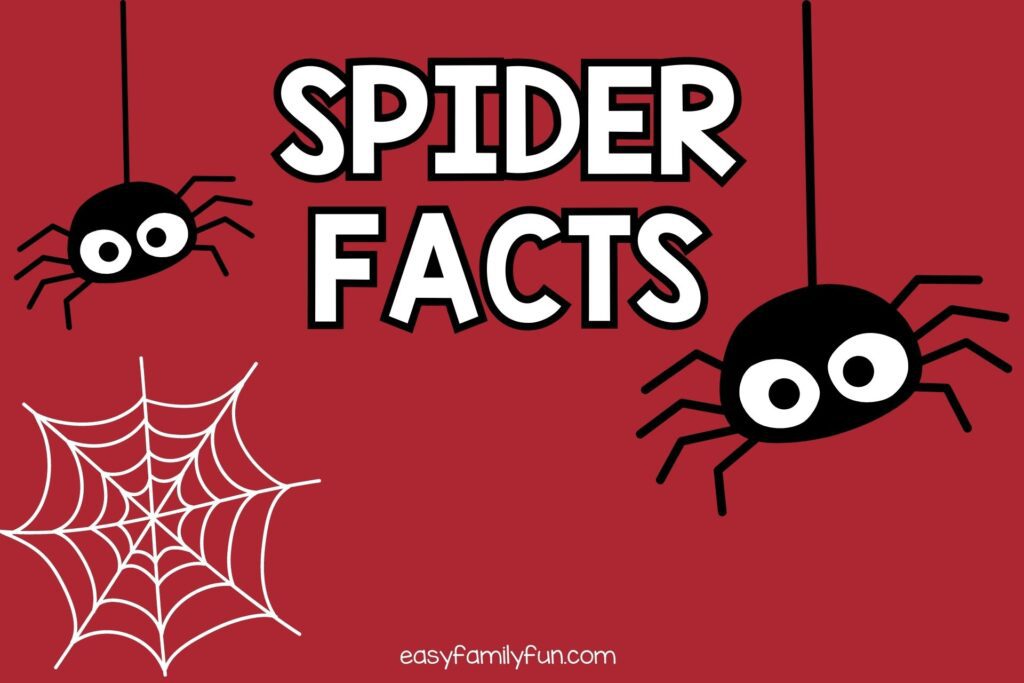
Did you know that spiders are pretty remarkable? Whether you think they’re cool or creepy, there’s no denying that spiders have some awesome abilities. So before you scrunch up your nose and say, “Ewww, spiders!” let’s dig into the web of wonders that surround these fascinating to learn more about these 8-legged friends.
Did you know that one of the biggest misconceptions is that spiders are dangerous? While it’s true that some spiders are venomous, the vast majority are harmless to humans. In fact, they’re the good guys in most ecosystems. They eat a ton of insects, acting like natural pest controllers. So the next time you see a spider in your home, you might want to think twice about squishing him.
Want another fun spider fact? Spiders produce silk that’s five times stronger than steel of the same diameter. Engineers and scientists are so amazed by this that they’re studying spider silk for all sorts of applications, from medical sutures to bulletproof vests.
But wait, there’s more! You might have heard of famous spiders like the tarantula or the black widow, but did you know there are over 48,000 known species of spiders? They come in all shapes and sizes, and they’ve adapted to survive in environments ranging from scorching deserts to freezing tundras. Some even “fish” for their food, while others can cartwheel away from danger. Yes, you read that right—cartwheel!
So, are you intrigued yet? I hope so, because we’re just scratching the surface of our fascinating facts about spiders. From their incredible silk to their vital role in ecosystems, spiders are undeniably captivating. Stick around as we unravel more amazing facts about these eight-legged wonders. Let’s dive into the web of knowledge!
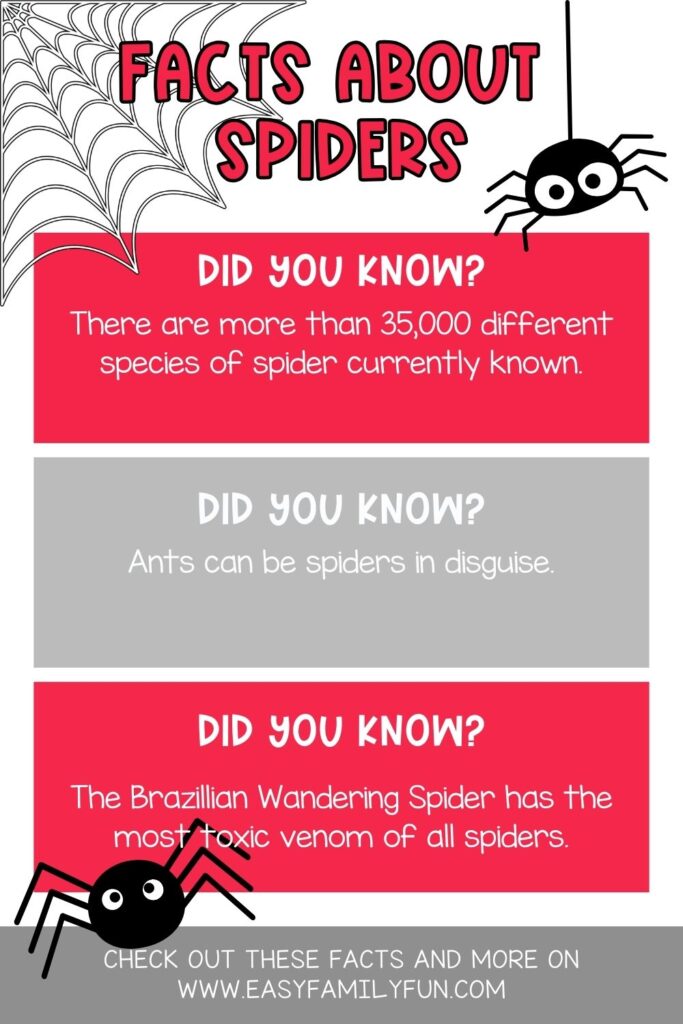
Best Facts about Spiders
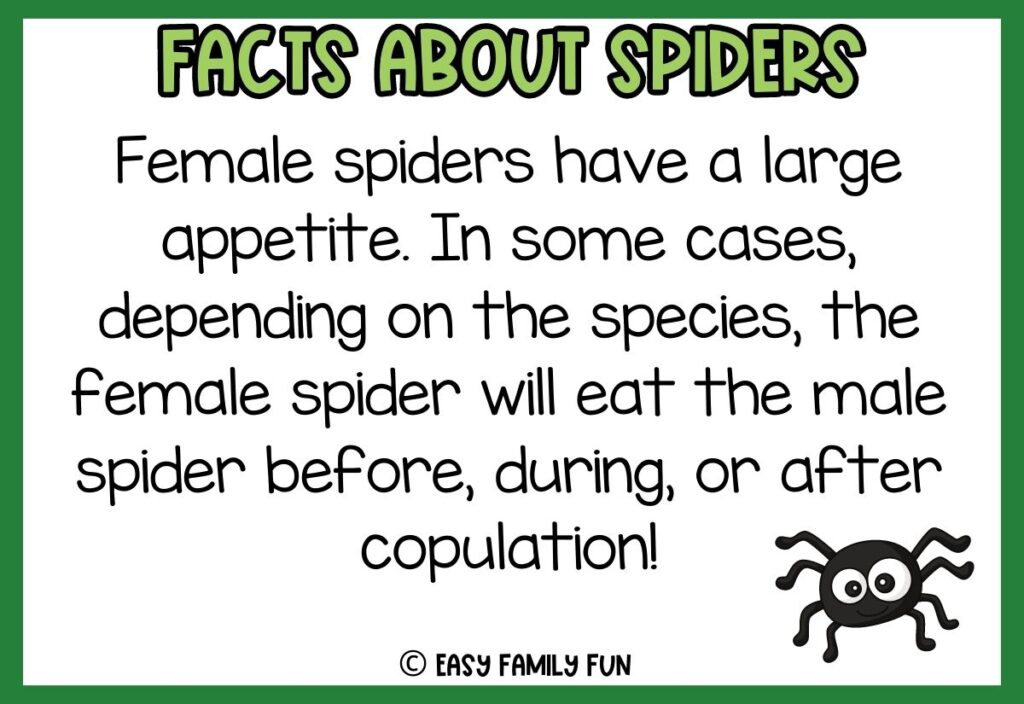
- Female spiders have a large appetite. In some cases, depending on the species, the female spider will eat the male spider before, during, or after copulation!
- The Brazillian Wandering Spider has the most toxic venom of all spiders.
- Tarantulas have become popular in the exotic pet trade.
- Mexican red-knee tarantulas are docile creatures.
- The female black widow spider is known for eating her mate after copulation.
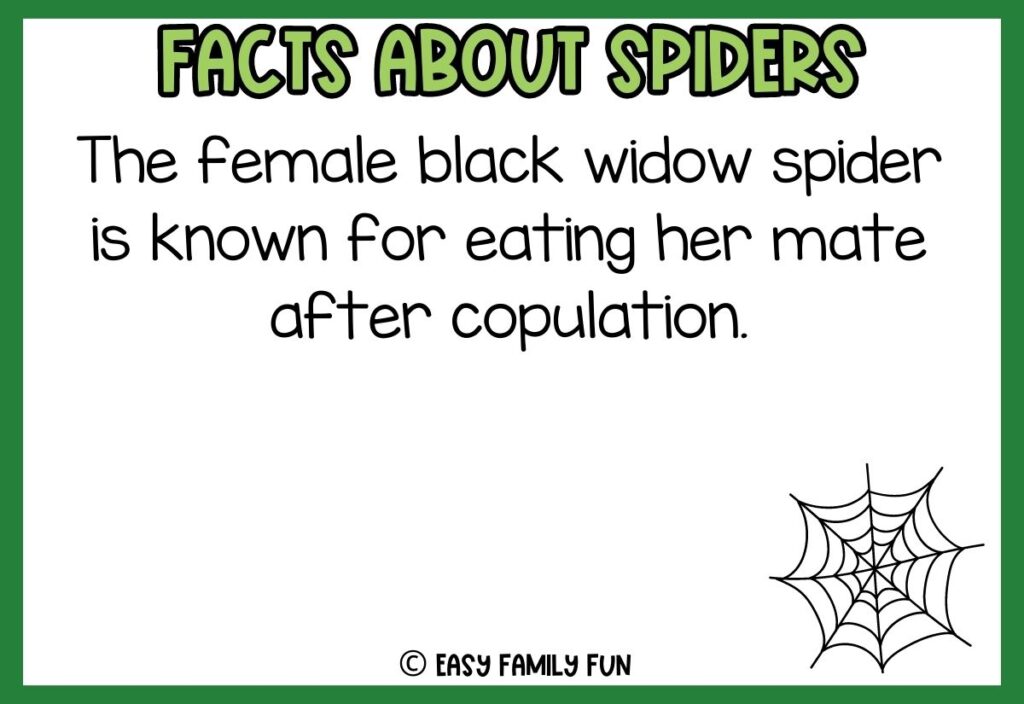
- Ants can be spiders in disguise.
- You can check a spider’s gender by looking at its face. If they look like they are wearing boxing gloves, the spider’s a male. If they are long and thin, it’s a female.
- The Hobo spider bite symptoms were local redness and some pain and twitching in the leg for 12 hours before it went away.
- A bite from a redback does pack a venomous punch; these spiders are non-aggressive and prefer to be left well alone in the back of your garden shed.
- The Costa Rican Zebra, known as the striped knee tarantula, is a calm but fast-moving spider.
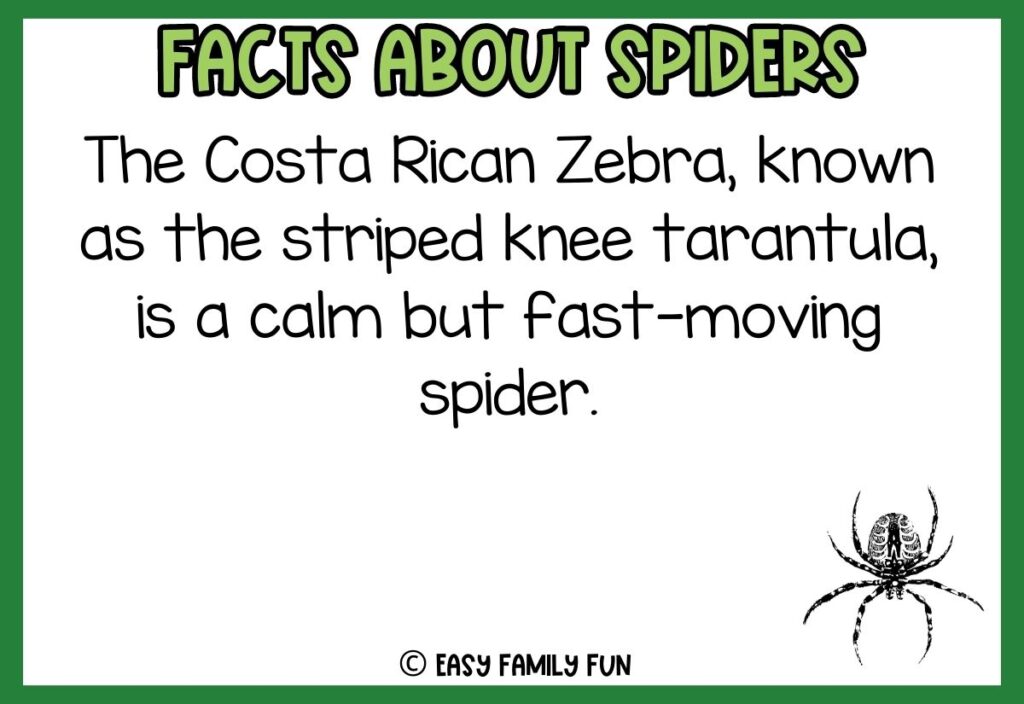
- Before building a new web, orb-weavers and other web-building spiders eat their old webs to recover those proteins.
- The peacock spider, Maratus volans, dance as part of their mating ritual, and it looks like the YMCA.
- The silk produced by spiders is incredibly versatile, used not only for webs but also for egg protection and silk “ballooning.”
- There are approximately over 35,000 different species of spider currently known.
- Spiders are scared of humans.
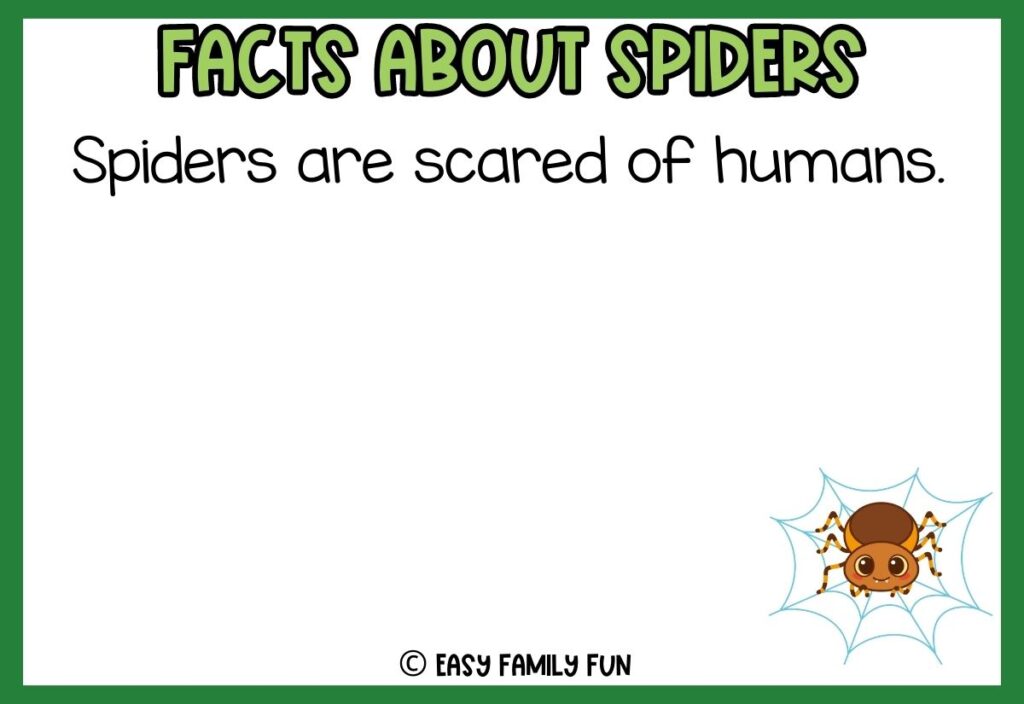
- The silk spun by spiders is incredibly strong and elastic, often used for webs and egg sacs.
- Jumping spiders have excellent vision and can leap many times their body length.
- Spiders molt to grow, shedding their exoskeleton and revealing a new one.
- Except for Antarctica, spiders live on every continent in the world.
- Female spiders can lay up to 3,000 eggs at one time
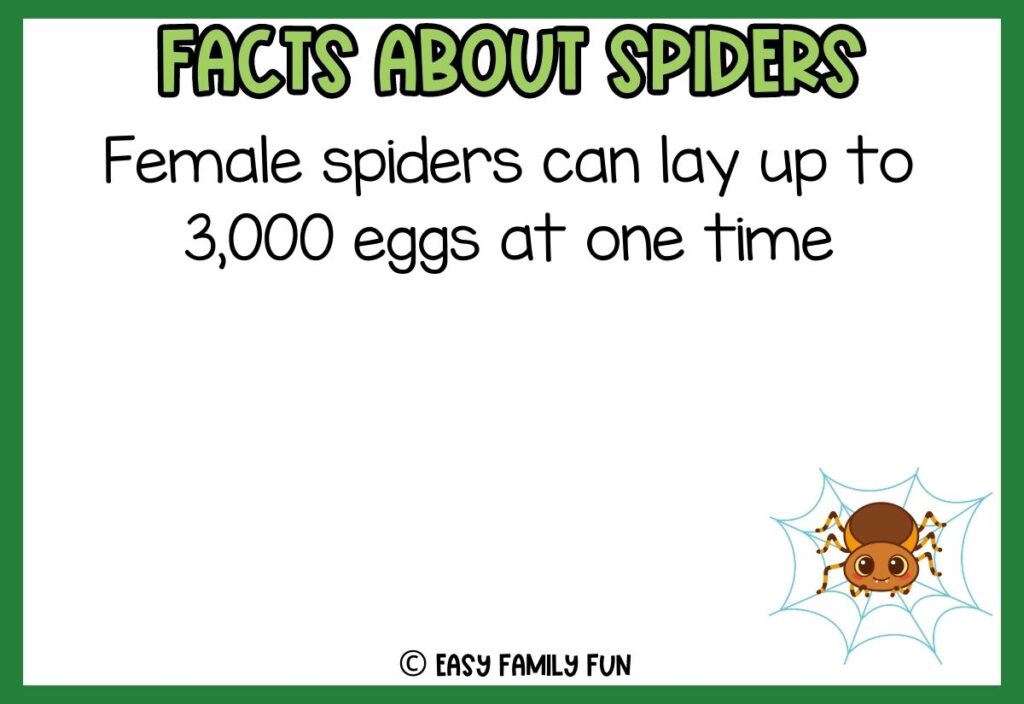
- Some tarantulas fling hair at predators.
- Most spiders shave water-repellent hairs that allow them to survive short periods of time underwater.
- The venomous funnel-web spider in Australia is known for its aggressive behavior and potent venom.
- Some spiders, like the raft spider, can move on water by creating a floating platform with their legs.
- Daddy longlegs are technically not spiders at all. They are a type of arachnid that is more closely related to scorpions.
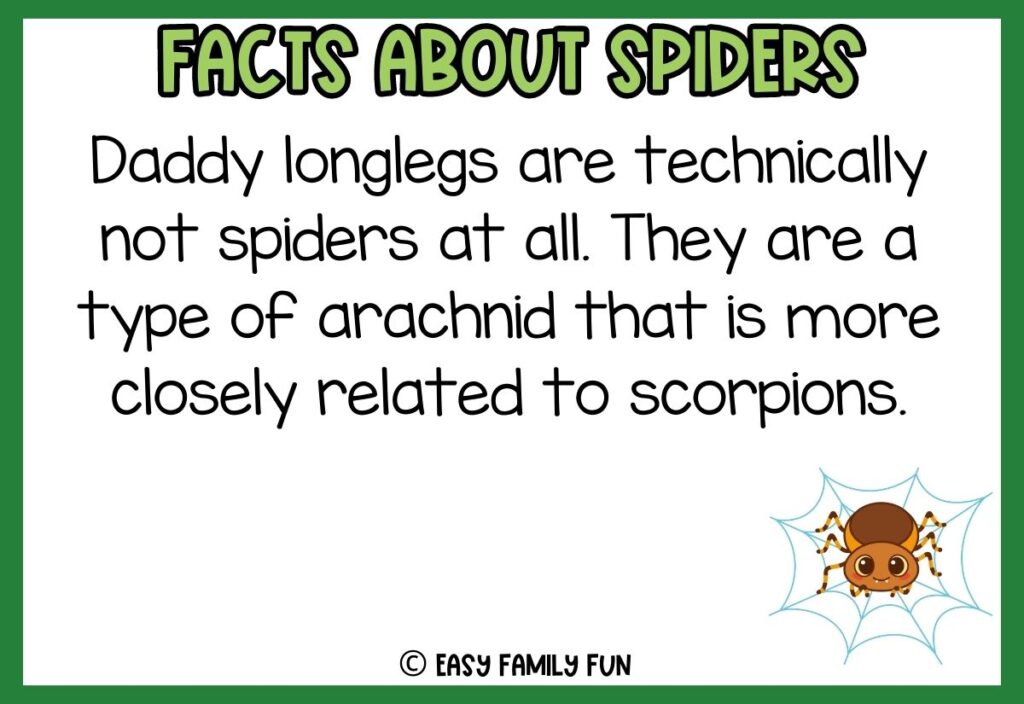
- All spiders produce silk but not all spiders make webs
- Some male spiders just want to be eaten.
- Spiders are arachnids, similar to scorpions and ticks.
- Spiders are everywhere!
- Spiders are found on every continent except Antarctica.
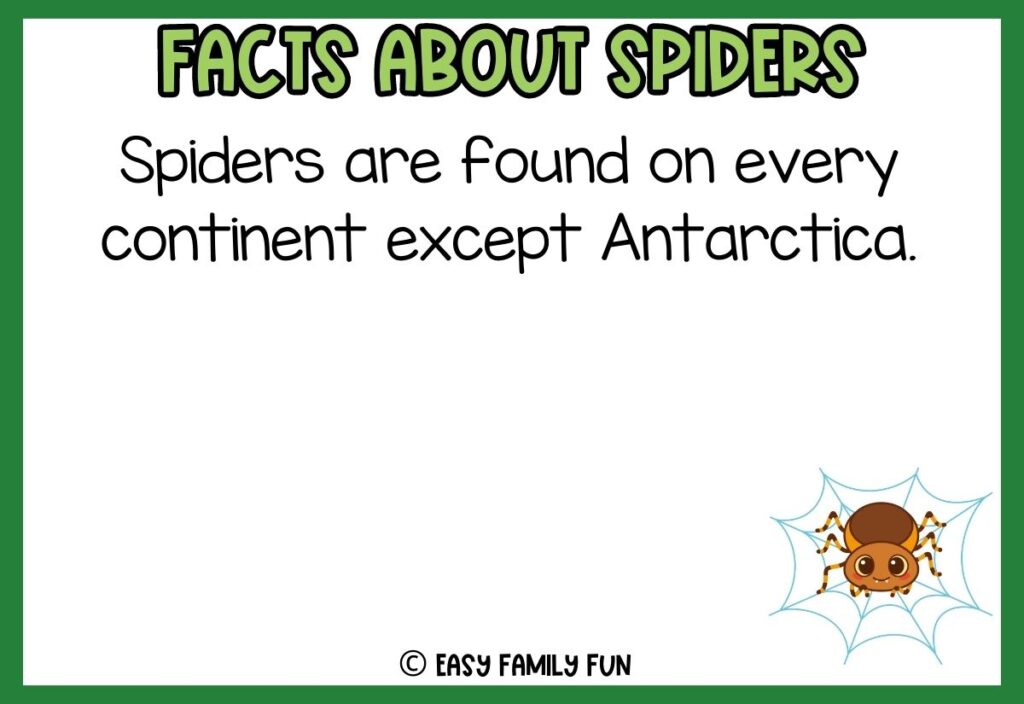
- Antivenin can reverse the effects of a Brazilian wandering spider bite.
- Spiders can survive in space.
- Not all spiders have eight eyes.
- Spiders are unable to eat solid food.
- Spider silk is liquid.
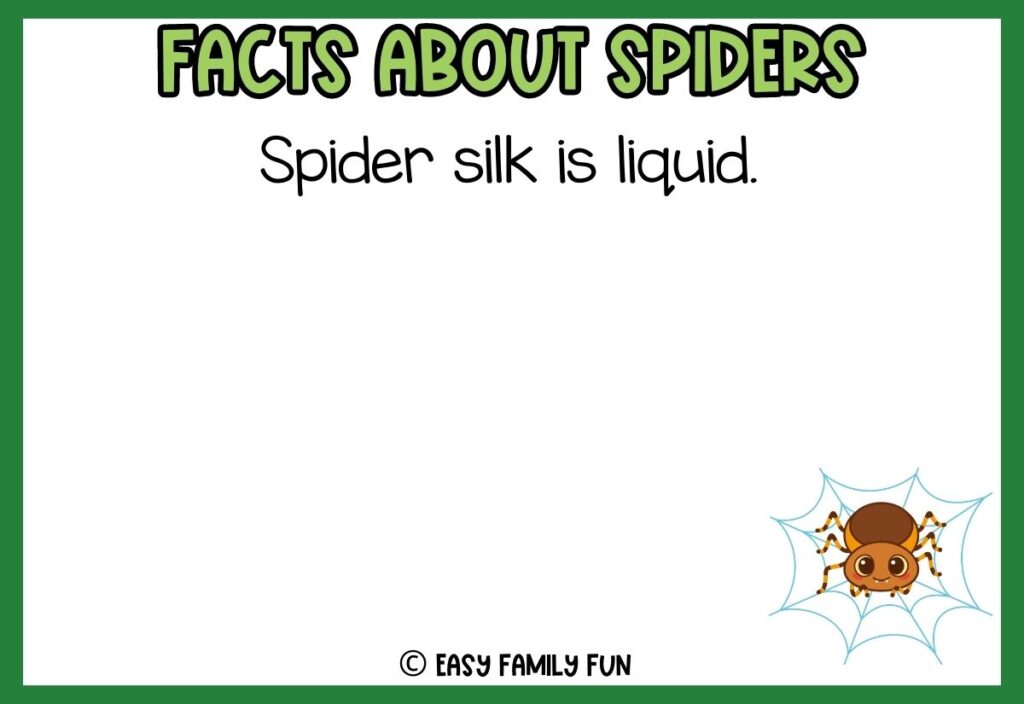
- The red widow spider is very uncommon and is a member of the black widow family, which is highly venomous. This spider can be harmful to people.
- Spiders have blue blood. There’s a scientific explanation for this, though. In humans, oxygen is bound to a molecule that contains iron, this gives our blood that red color. However, in spiders, the molecule that oxygen is bound to contains copper, which gives their blood the blue color.
- The spider’s lifespan ranges from 1 to 45 years old.
- Spiders rank seventh in total species diversity among all orders of organisms.
- Spiders are nearsighted.
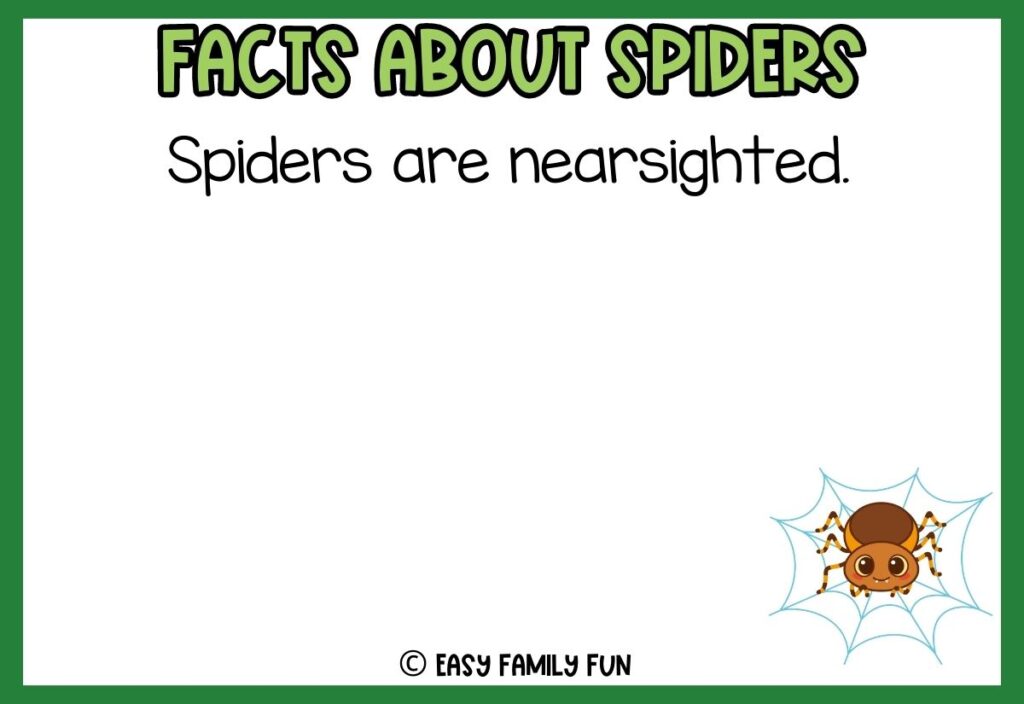
- Tarantulas can live for several decades, with some females reaching over 30 years.
- A single strand of spider silk is five times stronger than a steel strand of the same thickness.A spider web made of strands as thick as a pencil is also believed to stop an airplane in flight!
- All spiders are predators – but hunting techniques differ between spider families
- The earliest evidence of spiders dates back to 130 million years ago.
- Spiders can see what we cannot.
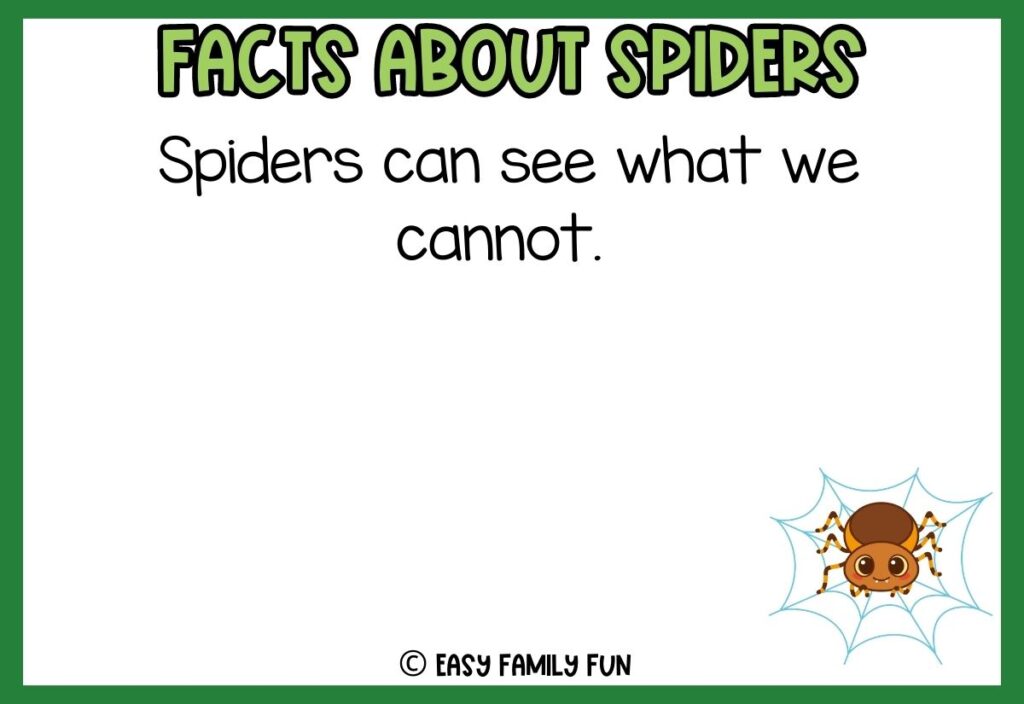
- Not All Spider Bites Are Deadly. The majority of spiders aren’t likely to bite humans.
- Spiders can be as small as 0.37 mm or as large as one foot in diameter.
- Jumping spiders can jump up to 50x their own length.
- Spiders can work together.
- Spiders Produce Various Types of Silk.

- Tarantulas use their urticating hairs as a defense mechanism, flicking them when threatened.
- The silk-producing glands of spiders are located in their abdomen.
- Crab spiders can change their color to match the flowers they perch on.
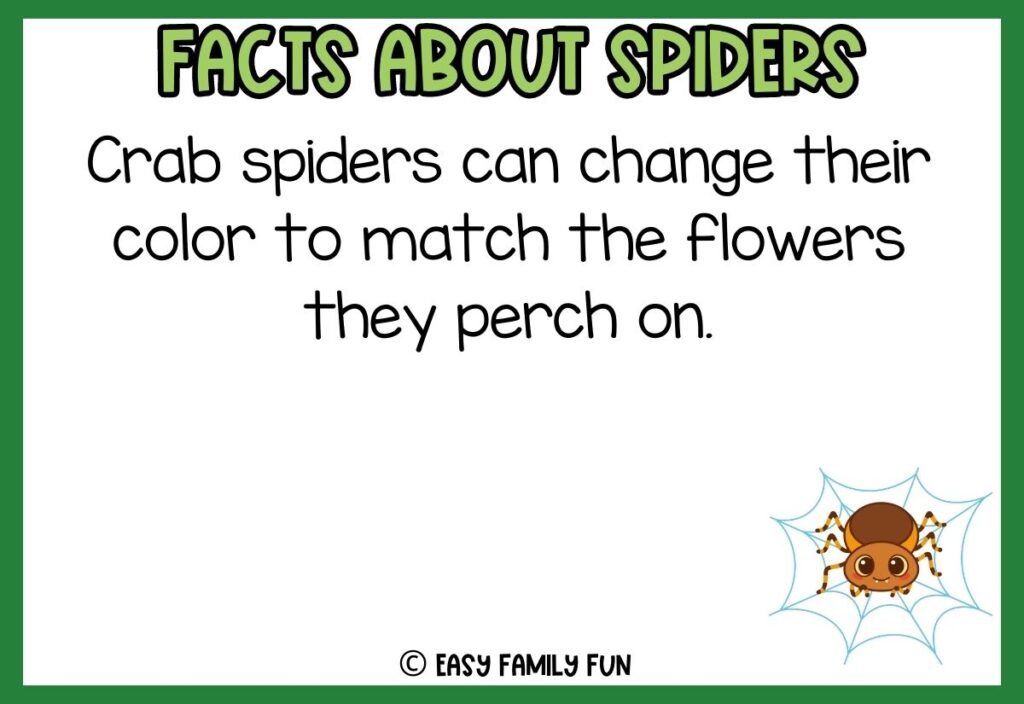
Do you have even more fascinating facts about spiders? Share it in the comments, and let us learn too!
Are you looking for more fun and engaging facts to share with your family? Check out these other posts for more facts!
- 100 Fascinating Facts about Mexico
- 75 Fascinating Facts About France
- 100 Purr-fectly Delightful Facts About Cats
- 87 Fascinating Facts About Owls
- 103 Super Cool Facts About Space
- 100 Interesting Facts About Hurricanes
- Facts About the 9/11 Memorial
- Facts About Spring
- Facts About Rosa Parks
- 50 Fascinating Facts About Butterflies
- 50 Fascinating Facts About Eagles
- Facts About Rome
- Facts About Lions
- Facts about Big Ben
- 100 Best Facts About Quartz for Kids
- 100 Best Facts About Cheese For Kids
- 100 Best Facts About Canada for Kids
- 100+ Out-of-This-World Facts about Earth
- 100 Epic Bug Facts for Kids
- 100 Weird Facts About Animals for Kids
- 85 Stellar Facts About Jupiter
- 135 Fascinating Facts About Ireland That Will Make You Fall in Love
- 50+ Interesting Facts about the Nervous System [Fact Cards]
- 55 Interesting Facts About Seattle [Free Fact Cards]
- 55 Best Facts about Frogs [Free Fact Cards]
- 66 Best Facts About Blueberries [Free Fact Cards]
- 37 Best Facts About Bacon [Free Fact Cards]
- 65 Best Facts About Comets [Free Fact Cards]
- 85+ Best Titanic Facts [Free Fact Cards]
- Interesting Facts about Ladybugs [Free Fact Cards]
- Abraham Lincoln Facts You Should Know [Free Fact Cards]
- Dive Into These Facts About Jellyfish [Free Fact Cards]
- Interesting Banana facts [Free Fact Cards]
- 20 Interesting Facts About Red Wolves [Free Fact Cards]
- Mt. Rushmore Facts: Carving History in Stone [Free Fact Cards]
- 66 Best Facts About Blueberries [Free Fact Cards]
- Over 100 Fun Facts about North Carolina [Free Fact Cards]
- 79 Electrifying Facts about Lightning [Free Fact Cards]
- 56 Interesting Facts About Snakes [Free Fact Cards]
- 56 Interesting Facts About Snakes [Free Fact Cards]
- 53 Fascinating Facts about Spiders [Free Fact Cards]
- 74 Interesting Facts About New Zealand [Free Fact Cards]
- 50 Interesting Facts About Apples [Free Fact Cards]
- 100 Purr-fectly Delightful Facts About Cats
- Buzzing with Knowledge: Explore 65 Fascinating Facts About Bees!
- 100 Marvelous Facts About Monkeys
- Gallop Through Knowledge: With These 75 Fascinating Facts about Horses
- Travel Back in Time With These Facts About the 13 Colonies!
- 52 Facts About Neptune for the Future Astronauts in Your Family
- 40 Incredible Facts About Your Heart
- 25 Remarkable Facts about James Madison
- 35 Oink-some Facts About Pigs
- 50 Neck-Stretching Facts about Giraffes
- 65 Patriotic Facts about the Statue of Liberty
- 50 Incredible Facts About Turtles
- 40 Mischievous Facts About Raccoons
- 135 Fascinating Facts About Ireland That Will Make You Fall in Love
- 85 Stellar Facts About Jupiter
- 100 Weird Facts About Animals for Kids
- 100 Epic Bug Facts for Kids
- 100+ Out-of-This-World Facts about Earth
- 100 Best Facts About Canada for Kids
- 100 Best Facts About Cheese For Kids
How Do I Print A PDF?
You’ll need a program that supports PDFs. Adobe Acrobat is a great option. Open the program, click file, then print. Select your printer and the number of copies you want to print. Be sure you click double-sided if you want it to print on both sides.
Can I Resell These?
You may not resell any printable that you find on our website or in our resource library. You may use them for class parties, at church, at home, or in the classroom. You may get these printed at an office supply store or copy center at your own expense.
